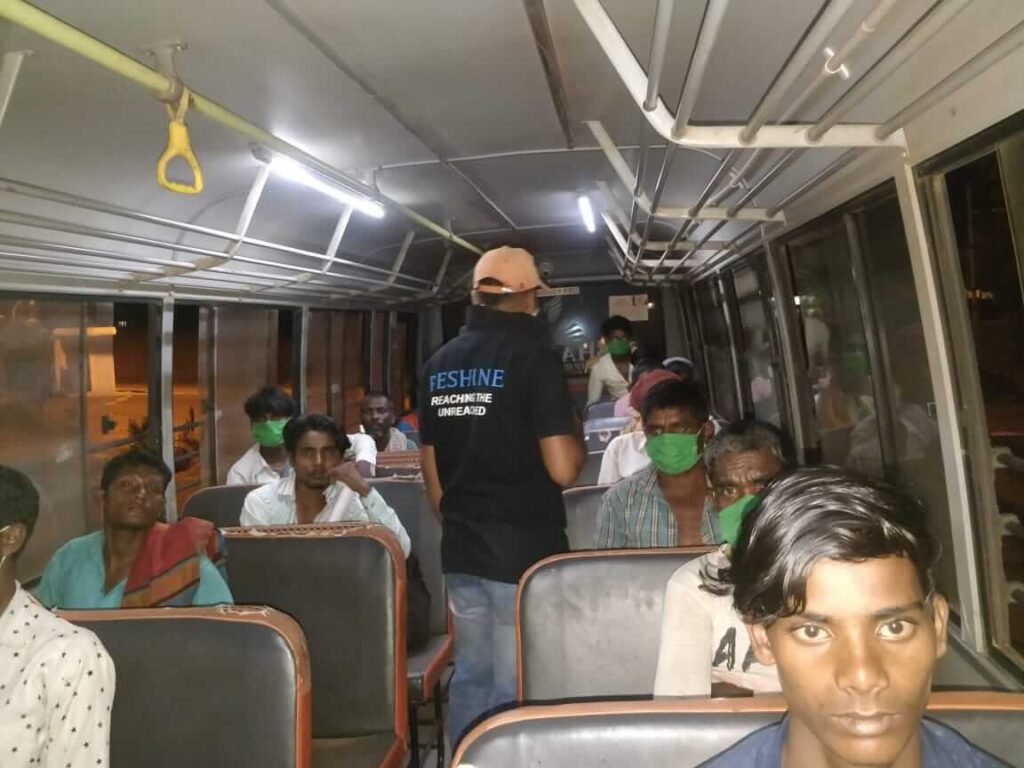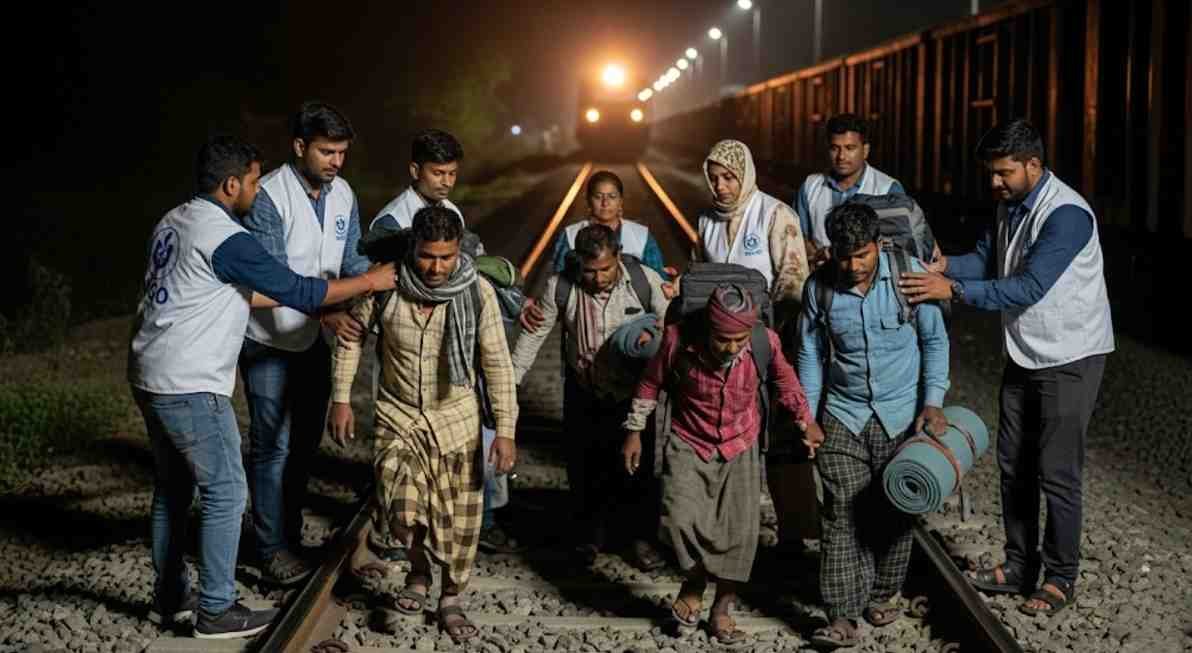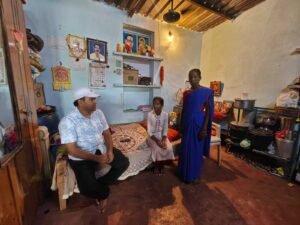Table of Contents
- Averting Tragedy: How Reshine Provided Emergency Relief for Migrants During COVID-19
- The Context: Why Emergency Relief for Migrants Was So Critical
- The Crisis Unfolds: Discovering the Immediate Need for Emergency Relief for Migrants
- Our Response: Implementing Immediate Emergency Relief for Migrants
- The Coordination: Comprehensive Emergency Relief for Migrants
- The Impact: Measuring Successful Emergency Relief for Migrants
- The Framework: How We Approach Emergency Relief for Migrants
- Why Support for Emergency Relief program for Migrants Matters
Averting Tragedy: How Reshine Provided Emergency Relief for Migrants During COVID-19
In the darkness of May 4, 2020, over 80 exhausted migrant workers lay sleeping on railway tracks in Bidar’s New Adarsh Colony. Unaware that goods trains still operated through the night, they had chosen what seemed like a flat, open space to rest their weary bodies. This is the story of how Reshine Organisation provided critical emergency relief for migrants during India’s COVID-19 lockdown, transforming a potential tragedy into a testament of human compassion and swift action.
For CSR managers, business owners, and compassionate individuals, this account demonstrates why flexible, rapid-response emergency relief for migrants is essential during crises. This emergency relief for migrants operation wasn’t planned in a boardroom—it was born from being present in the community and recognizing an urgent need. At Reshine Org, we believe that true humanitarian work means being ready to provide emergency relief for migrants and other vulnerable populations when they need it most.
This blog post details the unfolding crisis, our immediate response, and the coordinated effort that defined this successful emergency relief for migrants mission during one of India’s most challenging periods.
The Context: Why Emergency Relief for Migrants Was So Critical
To understand this rescue operation, we must first appreciate the unprecedented crisis that unfolded during COVID-19. The pandemic triggered one of the largest mass migrations in modern Indian history, creating an urgent need for emergency relief for migrants.
The situation facing migrant workers included:
- Sudden Job Loss: Nationwide lockdowns shut down factories and construction sites overnight
- No Social Safety Net: Most daily wage workers had no savings or unemployment benefits
- Transportation Shutdown: With all public transport suspended, millions began walking hundreds of miles home
- Desperate Conditions: Workers faced hunger, exhaustion, and dangerous travel conditions
This context explains why providing emergency relief for migrants became one of our most critical priorities during the pandemic.
The Crisis Unfolds: Discovering the Immediate Need for Emergency Relief for Migrants
The night of May 4, 2020, began like any other during the lockdown. Our team was coordinating food distribution when we received concerning information about migrant workers resting in a dangerous location.
What we discovered was alarming:
- 80+ Workers in Peril: Dozens of men were sleeping directly on active railway tracks
- Complete Vulnerability: They were exhausted from days of walking and unaware of the danger
- Imminent Risk: Goods trains continued operating through the night on these tracks
- Recent Precedent: Just days earlier, a similar situation in Aurangabad had ended in tragedy
This was precisely the type of scenario that requires immediate emergency relief for migrants—where minutes literally meant the difference between life and death.
Our Response: Implementing Immediate Emergency Relief for Migrants
When we reached the railway tracks, our team moved quickly to provide emergency relief for migrants in the most direct way possible—by saving lives first.
Our immediate emergency relief for migrants included:
- Evacuation from Danger: We gently woke the workers and explained the life-threatening risk
- Safe Relocation: We moved all 80+ individuals to a secure location away from the tracks
- Basic Needs Met: We provided immediate food, water, and medical attention
- Emotional Support: We offered reassurance and comfort to traumatized individuals
This initial emergency relief for migrants was completed just in time—preventing what could have been another devastating railway tragedy.

The Coordination: Comprehensive Emergency Relief for Migrants
True emergency relief for migrants requires more than just immediate rescue. It demands comprehensive support and coordination with authorities to ensure sustainable solutions.
Our extended emergency relief for migrants involved:
- Government Partnership: We worked closely with district authorities to arrange proper shelter
- Travel Arrangements: We coordinated with officials to secure permissions for their journey home
- Logistical Support: We arranged transportation and provided food for their travel
- Documentation Assistance: We helped navigate the paperwork required for inter-state travel
This coordinated approach to emergency relief for migrants ensured that the workers didn’t just survive the night—they safely reached their homes and families.
The Impact: Measuring Successful Emergency Relief for Migrants
The success of any emergency relief for migrants operation must be measured in both immediate and long-term outcomes.
The results of this emergency relief for migrants operation:
- 80+ Lives Saved from potential railway tragedy
- All Workers Safely Returned to their home states
- Families Reunited after weeks of separation and uncertainty
- Community Trust Built through reliable crisis response
- System Strengthened for future emergency responses
This emergency relief for migrants mission demonstrated that with proper coordination and immediate action, even the most desperate situations can have positive outcomes.
The Framework: How We Approach Emergency Relief for Migrants
At Reshine Org, we’ve developed a systematic approach to providing emergency relief for migrants based on this and other COVID-19 experiences.
Our framework for emergency relief for migrants includes:
- Rapid Assessment: Immediate evaluation of needs and risks
- Life-Saving First: Addressing the most critical dangers first
- Stakeholder Coordination: Working with government and community partners
- Comprehensive Support: Meeting both immediate and longer-term needs
- Dignity Preservation: Treating all individuals with respect and compassion
This structured approach to emergency relief for migrants ensures we can respond effectively to future crises.
Why Support for Emergency Relief program for Migrants Matters
The need for emergency relief for migrants didn’t end with COVID-19. Climate disasters, economic shifts, and regional conflicts continue to displace vulnerable workers, making ongoing preparedness essential.
Supporting emergency relief for migrants means:
- Saving Lives in immediate danger situations
- Protecting Human Dignity during vulnerable moments
- Strengthening Communities by supporting their most vulnerable members
- Fulfilling CSR Mandates through meaningful humanitarian work
- Building Resilience for future crisis response
Help Us Be Ready
At Reshine Organisation, we work daily to collect surplus food and deliver it to hungry families. Your support can help us reach more people. Donate today and be part of the change.
The migrant workers we rescued that night returned to their families because people like you supported our work. Your partnership enables us to maintain the capacity for rapid response when the next crisis emerges.




